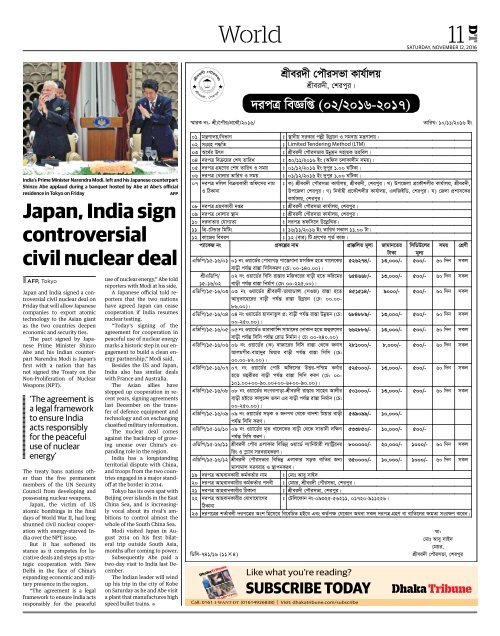DT e-Paper, Saturday, 12 November, 2016
Create successful ePaper yourself
Turn your PDF publications into a flip-book with our unique Google optimized e-Paper software.
World<br />
11<br />
SATURDAY, NOVEMBER <strong>12</strong>, <strong>2016</strong><br />
<strong>DT</strong><br />
India’s Prime Minister Narendra Modi, left and his Japanese counterpart<br />
Shinzo Abe applaud during a banquet hosted by Abe at Abe’s official<br />
residence in Tokyo on Friday<br />
AFP<br />
Japan, India sign<br />
controversial<br />
civil nuclear deal<br />
• AFP, Tokyo<br />
Japan and India signed a controversial<br />
civil nuclear deal on<br />
Friday that will allow Japanese<br />
companies to export atomic<br />
technology to the Asian giant<br />
as the two countries deepen<br />
economic and security ties.<br />
The pact signed by Japanese<br />
Prime Minister Shinzo<br />
Abe and his Indian counterpart<br />
Narendra Modi is Japan’s<br />
first with a nation that has<br />
not signed the Treaty on the<br />
Non-Proliferation of Nuclear<br />
Weapons (NPT).<br />
‘The agreement is<br />
a legal framework<br />
to ensure India<br />
acts responsibly<br />
for the peaceful<br />
use of nuclear<br />
energy’<br />
The treaty bans nations other<br />
than the five permanent<br />
members of the UN Security<br />
Council from developing and<br />
possessing nuclear weapons.<br />
Japan, the victim of US<br />
atomic bombings in the final<br />
days of World War II, had long<br />
shunned civil nuclear cooperation<br />
with energy-starved India<br />
over the NPT issue.<br />
But it has softened its<br />
stance as it competes for lucrative<br />
deals and steps up strategic<br />
cooperation with New<br />
Delhi in the face of China’s<br />
expanding economic and military<br />
presence in the region.<br />
“The agreement is a legal<br />
framework to ensure India acts<br />
responsibly for the peaceful<br />
use of nuclear energy,” Abe told<br />
reporters with Modi at his side.<br />
A Japanese official told reporters<br />
that the two nations<br />
have agreed Japan can cease<br />
cooperation if India resumes<br />
nuclear testing.<br />
“Today’s signing of the<br />
agreement for cooperation in<br />
peaceful use of nuclear energy<br />
marks a historic step in our engagement<br />
to build a clean energy<br />
partnership,” Modi said.<br />
Besides the US and Japan,<br />
India also has similar deals<br />
with France and Australia.<br />
The Asian allies have<br />
stepped up cooperation in recent<br />
years, signing agreements<br />
last December on the transfer<br />
of defence equipment and<br />
technology and on exchanging<br />
classified military information.<br />
The nuclear deal comes<br />
against the backdrop of growing<br />
unease over China’s expanding<br />
role in the region.<br />
India has a longstanding<br />
territorial dispute with China,<br />
and troops from the two countries<br />
engaged in a major standoff<br />
at the border in 2014.<br />
Tokyo has its own spat with<br />
Beijing over islands in the East<br />
China Sea, and is increasingly<br />
vocal about its rival’s ambitions<br />
to control almost the<br />
whole of the South China Sea.<br />
Modi visited Japan in August<br />
2014 on his first bilateral<br />
trip outside South Asia,<br />
months after coming to power.<br />
Subsequently Abe paid a<br />
two-day visit to India last December.<br />
The Indian leader will wind<br />
up his trip in the city of Kobe<br />
on <strong>Saturday</strong> as he and Abe visit<br />
a plant that manufactures high<br />
speed bullet trains. •<br />
Like what you’re reading?<br />
SUBSCRIBE TODAY<br />
Call: 0161-I-WANT-<strong>DT</strong> (01614926838) | Visit: dhakatribune.com/subscribe<br />
Dhaka Tribune


















